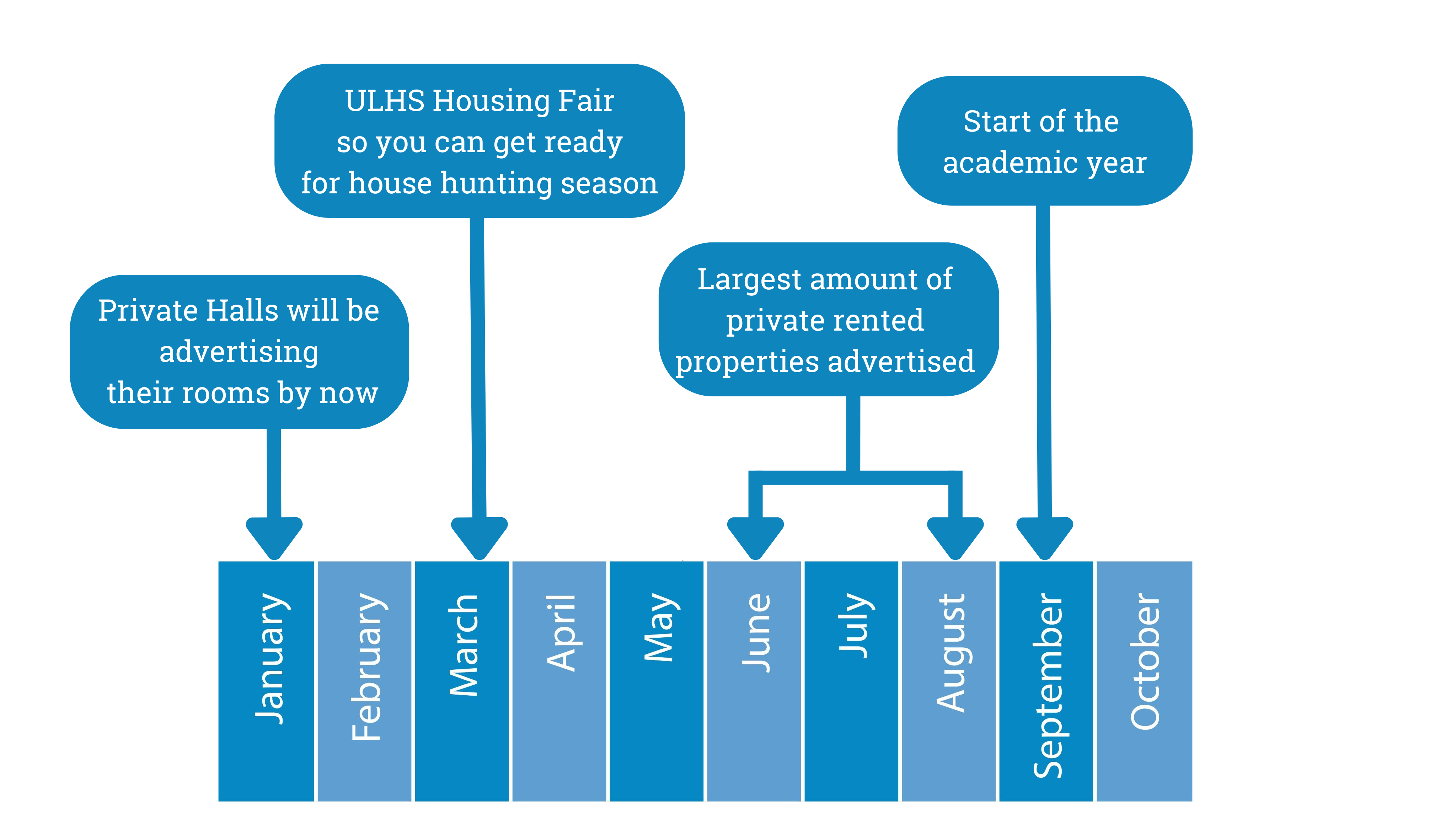Find your accommodation


When to start looking for accommodation
Properties are usually advertised around one to two months before the move-in date. January to April is generally too early to be going on viewings in London.
The ULHS typically hosts the annual Housing Fair in spring each year. This helps students get ready for ‘housing-hunting season’.
Rooms in private halls of residence are generally advertised earlier in the academic year, sometimes as early as September/October.
A typical private renting timeline:
Where to look
Check out our Property Platform:
- Search for flats, houses and rooms
- Filter results by price, property type and distance from your campus
- All accommodation providers have signed up to our Code of Good Practice
- You can be confident that the University of London Housing Service will fully investigate any issues or complaints you have
University accommodation
The University of London also offers accommodation to students! Check out what is available in the Intercollegiate Halls.
Letting agents
Letting agents have access to large numbers of landlords and properties and can be a good way to find accommodation.
Which agent should I use?
There are several letting agents registered with and advertising on the ULHS property platform which you can access via housing.london.ac.uk
Can letting agents charge fees?
There are very strict limits on the fees that letting agents can charge. See the Fees page for more information on what can be charged.
Any fees that are charged should:
- Not be prohibited by the Tenant Fees Act
- Not be ‘hidden’ fees
- Be clearly displayed on the agent’s website and office premises
- Include any additional taxes and charges
Is my money safe?
All letting agents must be members of a ‘client money protection scheme’. These schemes make sure tenants are compensated if any agent cannot repay their money (e.g. if they go out of business).
Agents must advertise which scheme they are members of in their office and on their website. At the time of writing, there are six government approved CMP schemes. If you can't see this advertised on their website, you should ask an agent for their certificate.
When making any payments (holding/ security deposits and/or rent) be sure to never pay any person other than the landlord, or the agent's company account.
Should I trust letting agents?
Most letting agents you encounter will be genuine, but in rare cases you may find "agents" offering properties online are criminals looking to scam unsuspecting renters.
A legitimate letting agent must:
- Be a member of a redress scheme
- Be a member of a client money protection scheme
- Clearly display fees and memberships on their website and office premises
- Have a complaints procedure
You should still be cautious with agents who appear to be legitimate, and ensure any promises they make are in writing.
Remember:
- Letting agents work in the interest of the landlord, not the tenant
- Letting agents or landlords do not always need to draw your attention to the faults or downsides of a property
- Never pay anyone but the letting agent company account or landlord
Redress Schemes
All agents must be a member of a redress scheme by law. You can search online to find out which one they are a member of.
The two redress schemes are:
- The Property Ombudsman tpos.co.uk
- The Property Redress Scheme theprs.co.uk
Have a complaint about a letting agent?
- Tell the letting agent
- Get in touch with the ULHS for advice.
- If the complaint cannot be resolved directly, refer it to the relevant redress scheme
Professional bodies and accreditation
Some letting agents are members of other professional bodies or accreditation schemes and are expected to offer a higher standard of service.
Some of the well-known accreditation schemes include:
- Propertymark propertymark.co.uk (Formerly the Association of Residential Letting Agents)
- Safeagent safeagents.co.uk National Approved Letting Scheme
- RICS rics.org/uk Royal Institute of Chartered Surveyors
- Trading Standards Approved buywithconfidence.gov.uk Vetted and approved by Trading Standards
AD The Stay Club, London
AD The Stay Club, London
Other Websites
There are many other websites which you can use to search for accommodation. These are some of the most popular ones for students.
Letting agents also advertise here:
• On the Market
• Rightmove
• Zoopla
For individual rooms or flatshares:
• SpareRoom
You may decide to use social media to look for accommodation. There are many groups on websites like Facebook where individuals offer spare rooms or properties. However, these are completely unregulated, so you must always be aware of possible scams.
Scams
Not all websites will perform checks on the properties being advertised or the people who are placing the adverts.
Some offers of accommodation will not be genuine. Scammers will often target students, particularly those who are new to London or looking for accommodation online from abroad.
There are no websites that are completely guaranteed to be free of scams.
How do I spot a scam?
Not all scams are the same. Some of the common signs of a scam are:
- The price is a lot lower than similar properties in the area
- You're offered a discount for up front payment of rent
- You may be asked to pay a deposit before viewing. (You should never do this!)
- You are asked to pay a person or company that is different to the agent or landlord
- You may be asked to transfer money via a money transfer service such as Western Union or AliPay
- The landlord sends you a copy of their own personal documents, such as their passport or driving license
- An internet search shows lots of negative reviews
Student stories: Laura
Laura found a property on Facebook that was only five minutes from her central London university. The landlord was too busy to do lots of viewings as he didn't live in London. He said he'd only show someone around if they paid him a £500 deposit first, as he didn't want to waste his time. He sent a copy of his passport to show he was genuine.
Laura paid, but when she went to view the property the landlord didn't reply to her Whatsapp messages. She walked around the local area for an hour, but the address didn't seem to exist. Laura had been scammed. The "landlord" had stolen someone else's identity to look more legitimate. Her money was lost.
Checks you can do if you're worried
- Check the websites of any letting agents you encounter and ensure they are in a redress scheme and Client Money Protection scheme before you pay them any money.
- Check the Land Registry and download the title register of the property (costs £7) to see if the landlord on your contract is the same as the person who owns it.
- Look up the letting agent's company name on Companies House. A company that has only been registered very recently, or has been 'dissolved' or 'struck off' is much higher risk to pay money to.
- Always view the property in person before sending any money
- Book a contract checking appointment.
What happens if money is paid to a scammer?
It can be very difficult to get money back when you have paid it to a scammer. It's extremely important to be careful of scams when looking for privately rented accommodation.
If you think you have been a victim of a property scam, contact Action Fraud.
Student stories: Ahmed
Ahmed contacted an agent he'd found online to view a property in East London. The modern one bedroom flat was available for £300 per month less than other properties he'd found. He met the agent at the property for a viewing. Afterwards, the agent sent payment instructions and asked for the first three months rent and deposit.
The agent told Ahmed that she was receiving a lot of interest for the property, and he needed to pay quickly if he wanted to rent it. He transferred the money before he did any checks on the agency. After he paid, he found some information online suggesting his letting agent might be a scammer. There was no evidence the agent was a member of a Client Money Protection Scheme, and the company had only been established 3 months ago.
On the move-in date, Ahmed couldn't contact the agent. It turned out the property had been rented by the "agent" on a holiday let website for a few days. The "agent" then conducted viewings, and took deposits and rent from six different students. It was a scam. Ahmed reported the crime to Action Fraud and contacted his bank, but he couldn't get his money back.
Scam warning signs
Unusually low rent, payment before viewing, payment details don't match the agent company or landlord name, money transfer services, all communication is over text or WhatsApp - or things just don’t seem right!
Word of mouth
Sometimes good rental properties are not openly advertised – instead the current tenants can put the landlord or agent in touch with friends or acquaintances who are looking for somewhere to live.
To make sure the place is right for you, ask the current tenants some questions:
- How good is the landlord at responding to repair issues?
- What are the neighbours like?
- How much are the bills?
- What is the local area like?
Newspapers
A small proportion of rooms and properties may be advertised in print. However, this is increasingly uncommon.
Local newspapers and magazines sometimes advertise rooms or properties under the ‘classifieds’ section.
Community noticeboards and shop windows
Sometimes rooms and properties are advertised informally on postcards or home-printed adverts.
Caution
A room or property that has been advertised on a University website or noticeboard, may not have been fully vetted or approved by your University.
SECTION: Top 6 tips
SECTION: How much does it cost?










